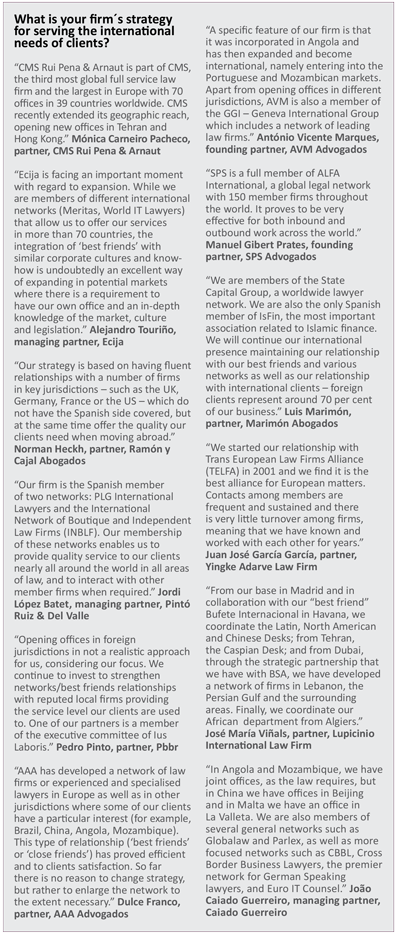Global annual report 2017: Picking out the positives
The uncertainty regarding Brexit continues to cast a shadow over the Spanish and Portuguese economies, but Iberian lawyers are taking positives from the whole affair – meanwhile, the debate about global firms versus networks and ‘best friends’ rages on
As the Brexit saga rumbles on, lawyers in Spain and Portugal are trying to see the bright side. Some partners in Spain feel that the country could benefit from the desire of some European bodies and financial institutions to relocate some, if not all, of their UK operations to mainland Europe. That said, there is a view that Spain could have made a bigger effort to promote itself as a potential location. Yet, there is a belief that law firms in Spain and Portugal could be receiving instructions from clients that want to establish themselves in Madrid, Barcelona and Lisbon due to the fallout from last year’s UK referendum. What type of Brexit will we eventually see? A ‘soft’ one? A ‘hard’ one? Or something in between? Few people can answer these questions with any real authority, however, there is a view among some lawyers in Spain that what we will end up with will be something rather similar to what we have already – this conclusion is based on the view that a ‘soft’ Brexit is “in the interests of everyone”, as one partner says.
Leaving aside the Brexit question, lawyers in Iberia highlight significant opportunities in Latin America, China, Lusophone Africa, Australia, the Middle East and the US. The question is how best to serve clients in foreign jurisdictions. The debate about the best strategy rages on – some say that networks or ‘best friends’ relationships are no substitute for a law firm that has its own office in the relevant jurisdiction, but those on the other side of the fence counter that an independent firm will ensure that they find the client the best lawyers in each practice area in each jurisdiction regardless of which firm they work for.
 Brexit rethink
Brexit rethink
Brexit has meant that financial institutions are having a rethink regarding where they will base their operations, says Allen & Overy partner Adolfo Zunzunegui. However, he adds that, while Germany, France, Ireland and Luxembourg are under consideration, “Spain was not quick enough to propose itself as a possible location, though it might get a piece of cake, there might be some bank business units moving here”.
Roca Junyent’s Madrid managing partner Carlos Blanco agrees that Brexit presents a “window of opportunity”, given that some businesses might move back-office operations to Spain. He adds that Brexit could also lead to some UK firms reassessing their structure and opening offices in the Spanish market. Blanco also points out that Spain is among the countries bidding to host the European Medicines Agency after the decision was made to relocate it from the UK due to Brexit. It is also anticipated that the European Banking Authority will also be relocated from the UK.
The recovery of the Spanish economy has largely been a result of the international expansion of Spanish corporations, says Uría Menéndez partner Fernando Calbacho. He adds that this expansion has taken place in Australia, Latin America, Europe, Africa and Asia, but the most attractive markets are those that have more potential for expansion. Calbacho continues: “A key area is Latin America, specifically Chile, Colombia, Peru, Argentina and Brazil – in these jurisdictions, there are opportunities for M&A and financing work.”
International disputes deriving from “soured” M&A transactions and investment claims financed by third party funders – including one brought before the US courts – have been among the matters handled by Araoz & Rueda, according to the firm’s partner Clifford Hendel. He adds that Spanish renewable energy disputes are creating opportunities, in addition to transactions in a range of sectors.
Latin America – specifically the Pacific Alliance countries (Mexico, Colombia, Chile and Peru) as well as Brazil – is currently the key area of opportunity, according to Cuatrecasas partner and the firm’s international head Antonio Baena. He adds that his firm is also particularly active in Asia and the Middle East, and also identifies growth potential in the Lusophone African countries (Angola and Mozambique). Baena says: “There continues to be an influx of investors from these countries coming to Spain and making acquisitions, looking for prime assets and robust companies. In addition, we continue to experience a constant stream of work from the UK and the US”
Meanwhile, corporate restructuring is taking place across Europe as companies anticipate the possibility of having to pay customs when trading with the UK following Brexit, explains Deloitte Legal partner Ignacio Echenagusia. He adds that this will create new business in the UK for law firms. Echenagusia continues: “Meanwhile, there is a lot of investment in Spain coming from China.”
White & Case partner Juan Manuel de Remedios says there are significant opportunities for project and infrastructure-related work in Australia, where the firm advises Spanish clients on projects involving roads, bridges and hospitals, for example. De Remedios adds that there is also an increase in international disputes involving Spanish construction companies.
 Starting from scratch
Starting from scratch
The current focus for Andersen Tax & Legal is building its network in Europe and Latin America, according to partner Gonzalo Cerón. However, he adds that there are also notable opportunities in South Africa and Nigeria, particularly in the areas of projects, acquisitions and global restructurings. Meanwhile, Cerón says that Cuba also has considerable potential: “It’s an interesting jurisdiction for the future, Cuba has to build its infrastructure from scratch.” That said, investors from China and France, for example are more active in Spain than Cuba, he adds.
On the issue of Brexit, Zunzunegui says that, despite the current uncertainty, he believes the outcome will not be dissimilar to the current situation. “I’m not sure how it will all end, however I cannot see the UK not continuing to do business as it has done in the past, I think we will end in a similar position, the UK can’t afford a hard Brexit,” he says. Another partner at a global firm remarks that a ‘soft Brexit’ is “in the interests of everyone”. He adds: “Brexit is not a good opportunity for us in the long-term.”
One partner remarks that his firm has some medium-sized renewable energy sector clients that find the Spanish market too small, and consequently the firm has advised such clients on investments in Asia, Latin America and the US. He adds that his firm’s strategy is not to have ‘best friends’ in foreign jurisdictions. “We don´t have formal ´best friends’, we tell our client that we can find them the best firm in the relevant jurisdiction – our best friend may not be best for the client.” He continues: “Networks are interesting in theory, but we’d rather stay open.” Other lawyers say that, while you can build personal relationships with partners at other firms, such relationships do not have to be formalised. One partner adds: “You have to offer clients a seamless quality [in foreign jurisdictions], you need a strong culture.”
Each law firm has a different strategy when it comes to serving clients in foreign jurisdictions. One option is to find the best lawyers in each jurisdiction for your client, the other is to accompany your client abroad and “make money”, as one partner puts it. Another lawyer argues that the major Spanish firms “have to be picky” about the jurisdictions they choose to focus on: “Latin America makes sense, but they could not start from scratch in other European jurisdictions.”
Brand awareness
Some partners argue that a law firm’s brand is not particularly significant when it comes to winning new business. Cerón says that when Olleros Abogados (of which he was formerly a partner) joined Andersen Tax & Legal, “we feared we may lose some clients, but that hasn’t happened – I think the name of the firm is important, there is value in a brand, but you have to build it on a daily basis.” Another partner puts it more bluntly: “If anyone thinks the power of a brand will win you work, you are wrong, though we are happy if clients want to follow our brand.” The main objective for law firms is to have “big clients who are loyal, this is ideal,” says one partner.
The more international a client is, the “wider the spectrum of lawyers they use”, says one partner working in the Madrid office of a ‘Magic Circle’ firm. He adds: “There might be questions about fees, but we need to build trust, we are competing every day with lawyers who are as good, or better, than us.” One partner argues that clients don’t want to be completely dependent on one law firm: “If you handle all legal aspects for the client, it’s more difficult for them to negotiate on fees.”
There has been an economic recovery in Spain, and in the European Union, says Blanco, with Spain being an “attractive target for investors, particularly from the US and the UK.” According to Baena, Spain is a “solid investment opportunity for international players”, while he adds that Latin America is a key market for Spanish firms. However, another partner argues that Spain has “not escaped from the crisis”. He adds that there is still a reluctance on the part of some investors to invest in Spain, and expects that, for his firm, the financial results for 2017 will not be as good as they were for last year. “We need regulatory certainty,” he says. Yet, the partner also comments that there will be a lot of opportunities for arbitration and there is also a lot more investment in Spain from China.
Echenagusia argues that Spain is recovering from the crisis and starting to grow. He continues: “There will be activity in the tourism sector, Chinese investment in real estate, as well as deals in the financial sector.” Meanwhile, Hendel expects a lot of dispute resolution work in the coming year. “Spanish companies are increasingly active internationally, inevitably this will trigger an increasing number of disputes, particularly arbitrations, in the traditionally litigious construction and energy sectors, in which Spanish companies are significant international players,” he says. Hendel adds: “While Spanish companies continue to have reservations about arbitration in domestic matters – and looking at some of the judgments handed down by the Spanish courts, one can perhaps understand these doubts – international arbitration is accepted as the only game in town for disputes of an international nature.”
Lawyers also anticipate that there will be significant M&A work in the coming year, as well as capital markets activity, financial litigation and regulatory work. In addition, tax litigation, corporate compliance and data protection matters are expected to produce a raft of instructions for lawyers.
According to Calbacho, there is uncertainty about which law firm model will prevail in the future. He adds: “Forty years ago, there were no global law firms, now we have seen the growth of global law firms, how will local or regional firms cope? I don’t know which model will prevail in this competition. They will probably continue to co-exist.”
Portugal: Tackling Brexit
From an international perspective, Brexit is without any doubt the most significant challenge facing Portuguese law firms, according to Nuno Galvão Teles, managing partner at leading Lisbon firm MLGTS. “The uncertainty regarding negotiations is already causing a strain on many sectors,” he explains. “The impact of the decision will be felt not only in the short term, but also in the long run, and will necessitate a lengthy process of adjustment.” However, Brexit also offers a number of opportunities, according to Galvão Teles. These include businesses relocating some of their operations, but also adapting their business models to meet the needs of the post-Brexit environment.
Meanwhile, cybersecurity and data protection are among the key priorities for European legislators, says Galvão Teles. He adds: “Legislators are trying to keep pace with technology, and companies are struggling to find safe ground – changes in regulations relating to personal data protection have considerable impact on economic activity, and impact on the daily life of every company.”
The internationalisation of Portuguese companies is another trend generating plenty of opportunities for Lisbon law firms, according to PLMJ managing partner Luis Pais Antunes. “Lawyers are increasingly crucial when it comes to identifying and understanding the challenges that face anyone who wants to invest in another country,” he argues. “It is not possible to define an effective internationalisation strategy unless the client obtains preliminary information on the legal and regulatory framework of the new target markets, and the forms of establishment and procedures to be followed from their lawyers.” Pais Antunes adds that Portuguese law firms are becoming more heavily involved in cross-border dispute resolution. He says: “Portuguese lawyers have experienced growing demand for them to join panels, lists of arbitrators and the world’s leading arbitration centres.”
VdA Vieira de Almeida partner Rui Amendoeira says oil industry work in Angola has been a key area of growth for the firm. In the last year, for example, the firm advised on the restructuring of the national oil company Sonangol. Amendoeira says: “Our international work has increased exponentially in the last two years, and currently represents anywhere between 20 per cent to 25 per cent of the firm’s turnover, up from less than 5 per cent in 2015.” He adds that, in order to meet this rapid growth in demand, the firm has taken the steps of reassigning fee earners from domestic practice teams to international teams, as well as expanding the number of multidisciplinary teams that are capable of handling work across different jurisdictions. In addition, the firm has also made lateral hires of associates from competitor firms that have experience in international work.
Unusually for a Portuguese law firm, CCA Ontier has identified Latin America as one of the regions offering the best opportunities for growth. Managing partner Domingos Cruz highlights the “democratic stabilisation and economic growth” of countries in Latin America, as well as the “creation of policies to better distribute wealth” as reasons to be optimistic about the region’s prospects as a source of legal work. “Their [Latin America’s] middle class now requires health, education, services, energy and infrastructure that currently doesn’t exist – the inadequacy, or nonexistence, of these kind of public resources is an opportunity for private investment through public-private partnerships (PPP).” Cruz adds that the low cost of Brazilian assets have attracted significant interest from foreign investors and contributed to a buoyant M&A market.
However, Linklaters’ Portugal managing partner António Soares argues that the priority markets for Portuguese law firms are still the Portuguese-speaking countries – such as Angola, Brazil, Mozambique and Timor – as well as Macao. “These markets continue to be the main source of the international work for firms with a presence in Portugal,” he says. This view is echoed by Duarte Garin, managing partner of Uría Menéndez-Proença de Carvalho who says the close relationship Portugal has with Portuguese-speaking countries around the world, particularly in Africa, presents a “great opportunity”. He adds: “The firms that develop their ability to offer services in different countries, while ensuring the same standard of quality, through lawyers that share their experience and local knowledge – irrespective of the nature of the arrangement between those lawyers – will be in a unique position to serve clients in those countries.”
While acknowledging the benefits of Portugal’s strong ties with Angola and Mozambique, SRS Advogados senior partner Pedro Rebelo de Sousa highlights Asia, and Singapore in particular, as having significant potential. “Where we see real opportunity is Singapore, through which we are accessing the greater Asian region, including Australia and India.”
|
What are now the most significant international (non-Iberian) opportunities for law firms? “The economic recovery, and political stability in the main economies of Western Europe, as well as low interest rates offer an opportunity for M&A transactions, both-cross border as well as those involving direct investment in Spain. It is likely that private equity funds will continue investing and divesting to complete their asset rotation cycles.” Álvaro Sainz, senior partner, Herbert Smith Freehills “There are several international markets where we can add value to clients in particular in Africa, South America and China.” Nuno Azevedo Neves, country managing partner (Portugal), DLA Piper “In a global world, we accompany our clients in their cross-border operations. A growing number of Spanish companies have started their internationalisation and require legal advice.” Rafael Suárez de Lezo, co-founder and partner, CMS Albiñana & Suárez de Lezo “The US market is very important and even more so now that Trump’s administration has recently declared that they will increase investment in the energy and infrastructure sectors. Spanish companies have traditionally been involved in both sectors in the US and have an international reputation. Therefore, we expect them, and the Spanish law firms accompanying them, to benefit from all new incoming energy and infrastructure projects in the coming years.” Iván Delgado, resident partner (New York), Pérez-Llorca “Concerns about the consequences of Brexit are in the spotlight. As a result, there are opportunities with London-based financial companies looking for existing, and CNMV-recognised, regulatory schemes in order to be able to operate from the EU. From the tax point of view, and related to Brexit, we are seeing some political movements aimed at making the tax system more attractive for UK nationals residing in Spain. However, other EU countries such as Portugal, Switzerland or Belgium are ahead in terms of these policies.” Adolf Rousaud, managing partner, RCD – Rousaud Costas Duran “The globalisation of companies, the creation of cross-border partnerships, investment management, entrepreneurial support and start-up companies. Also, cybersecurity, privacy, e-commerce and advancement of social networks.” Javier Cremades, founding partner, Cremades & Calvo-Sotelo Abogados |












